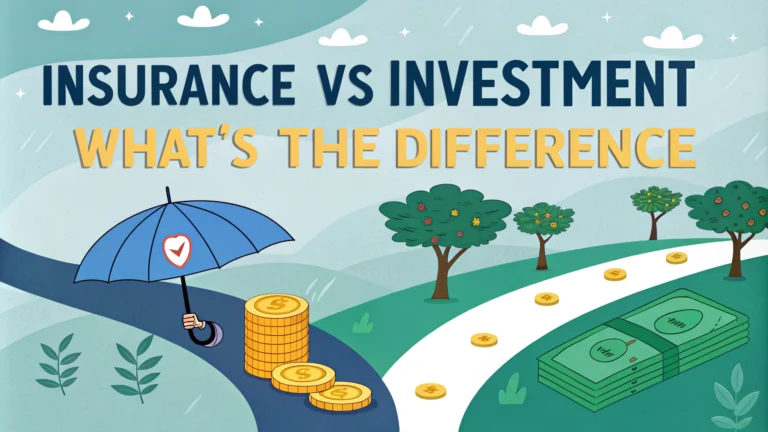Making smart financial decisions means knowing where to put your money. Many people struggle to differentiate between insurance and investment products, often mixing up their primary purposes.
Insurance offers protection against potential losses, while investments help grow wealth over time. Understanding these differences helps make better financial choices aligned with specific goals.
Key Differences Between Insurance and Investment Products
- Purpose: Insurance protects against financial loss, investments aim for wealth creation
- Risk Level: Insurance transfers risk, investments involve taking calculated risks
- Returns: Insurance provides guaranteed benefits, investments offer potential market returns
- Time Horizon: Insurance focuses on protection period, investments target growth period
Types of Insurance Products and Their Benefits
- Life Insurance: Financial protection for dependents
- Health Insurance: Coverage for medical expenses
- Property Insurance: Protection for assets
- Disability Insurance: Income replacement during inability to work
| Insurance Features | Investment Features |
|---|---|
| Fixed premiums | Variable returns |
| Guaranteed benefits | Market-dependent growth |
| Risk transfer | Risk taking |
Common Investment Vehicles and Strategies
- Stocks: Company ownership shares
- Bonds: Debt instruments
- Mutual Funds: Pooled investments
- Real Estate: Property investments
“Insurance is about protection, while investing is about growth. Both play distinct roles in a balanced financial plan.”
When to Choose Insurance vs Investment Products
Insurance products work best when protecting assets and income from specific risks. Consider insurance when:
- Income Protection: Supporting dependents or covering debt obligations
- Asset Protection: Safeguarding valuable property or business assets
- Health Security: Managing potential medical expenses
Investment products suit wealth-building goals. Choose investments when:
- Long-term Growth: Building retirement savings
- Wealth Creation: Expanding financial portfolio
- Income Generation: Creating passive income streams
Understanding Insurance-Investment Hybrid Products
Some financial products combine insurance and investment features, like variable life insurance or unit-linked insurance plans.
| Advantages | Disadvantages |
|---|---|
| Multiple benefits in one product | Higher fees and charges |
| Tax advantages | Lower investment returns |
| Simplified management | Less flexibility |
Building a Balanced Financial Portfolio
A well-structured portfolio needs both protective and growth elements.
- Emergency Fund: 3-6 months of living expenses
- Protection Layer: Basic insurance coverage
- Growth Components: Mix of investments based on risk tolerance
- Regular Review: Annual portfolio assessment
“Balance risk and return by matching financial products to specific life goals and time horizons.”
Smart Financial Decision Making
Follow these steps for better financial choices:
- Assess Goals: Define short and long-term financial objectives
- Evaluate Risk: Understand personal risk tolerance
- Research Options: Compare products and providers
- Review Costs: Calculate all fees and charges
- Seek Advice: Consult financial professionals when needed
Action Steps:
- List current insurance coverage and investment holdings
- Identify gaps in protection and growth needs
- Create a timeline for implementing changes
- Schedule regular portfolio reviews
Insurance vs Investment FAQs
General FAQs
Q: What is the main difference between insurance and investment?
A: Insurance provides financial protection against risks and losses, while investments aim to grow wealth over time through various financial instruments like stocks, bonds, or mutual funds.
Q: Which has better returns – insurance or investment products?
A: Pure investment products typically offer higher potential returns compared to insurance policies, as they’re designed specifically for wealth growth rather than protection.
Q: Can insurance policies also work as investments?
A: Yes, certain types like whole life insurance and universal life insurance combine insurance coverage with an investment component, known as cash value.
Long-tail Keyword FAQs
Q: How do term insurance returns compare to mutual fund investments?
A: Term insurance provides no returns unless death benefit is claimed, while mutual funds can provide market-linked returns averaging 8-12% annually over long periods.
Q: What are the tax benefits of life insurance vs retirement investments?
A: Both offer tax advantages:
- Insurance: Premium payments deductible under Section 80C
- Death benefits tax-free under Section 10(10D)
- Retirement investments: Tax deductions on contributions
- Returns taxed based on holding period and investment type
Q: Should I invest in ULIPs or direct mutual funds?
A: Consider these factors:
| ULIPs | Direct Mutual Funds |
|---|---|
| Higher charges | Lower expense ratio |
| Insurance included | Pure investment |
| Lock-in period | More flexible |
Q: Is term insurance with return of premium worth it?
A: Generally no, as the higher premiums could be better invested in pure investment products for potentially higher returns.
Q: What percentage of income should go to insurance vs investments?
A: Financial experts recommend:
- Insurance: 5-10% of income
- Investments: 20-30% of income
- Adjust based on age, dependents, and financial goals
Q: Which is better for child’s education – child insurance plan or mutual funds?
A: Mutual funds typically offer better returns for long-term education planning, while providing more flexibility and lower costs compared to child insurance plans.
Q: How do I split my portfolio between insurance and investments?
A: Follow this general framework:
- First secure adequate term insurance coverage
- Then allocate remaining funds to investments based on goals
- Maintain emergency fund separate from both



















